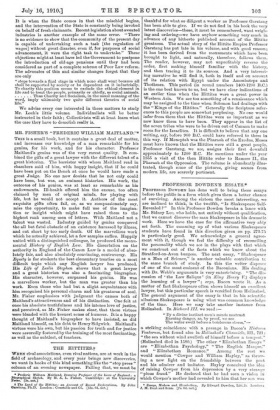MR. FISHER'S "FREDERIC WILLIAM MAITLAND."*
Tars is a small book, but it contains a great deal of matter, and increases our knowledge of a man remarkable for his genius, for his work, and for his character. Professor Maitland's genius was of the very rarest quality. It com- bined the gifts of a great lawyer with the different talent of a great historian. The barrister with whom Maitland read in chambers said of him, with happy insight, that if he could have been put on the Bench at once he would have made a great Judge. No one now doubts that he not only could have been, but was, an eminent historian. His work, the outcome of his genius, was at least as remarkable as his endowments. Ill-health offered him the excuse, too often claimed by men of original minds, for playing with life, but he would not accept it. Authors of the most exquisite gifts often fail, or, as we compassionately say, miss the opportunity, to make full use of the imagina- tion or insight which might have raised them to the highest rank among men of letters. With Maitland not a talent was wasted. Industry guided by genius conquered the all but fatal obstacle of an existence harassed by illness, and cut short by too early death. Of the marvellous work which he actually achieved, let a few samples suffice. Happily united with a distinguished colleague, he produced the monu- mental History of English Law. His dissertation on the authority in England of the Canon Law is a model of abso- lutely fair, and also absolutely convincing, controversy. His Equity is for students the beet elementary treatise on a most difficult topic which any English lawyer has produced. His Life of Leslie Stephen shows that a great lawyer and a great historian was also a fascinating biographer. His character, however, surpassed his genius. He was a marvellous worker, but the man was greater than his work. Even those who had but a slight acquaintance with him recognised his personal charm and his greatness of soul. Mr. Fisher emphasises with judgment the causes both of Maitland's attractiveness and of his distinction. One felt at once his absolute truthfulness and his intense love of justice, and perceived, as Mr. Fisher makes clear, that these virtues were blended with the keenest sense of humour. It is a happy thought of Maitland's biographer to have insisted, as did Maitland himself, on his debt to Henry Sidgwick. Maitland's virtues were his own, but his passion for truth and for justice were assuredly fostered by the training of the most fascinating, as well as the subtlest, of teachers.






































 Previous page
Previous page